韩素英翻译比赛原文
韩素音青翻译奖赛中文原文及参考译文和解析
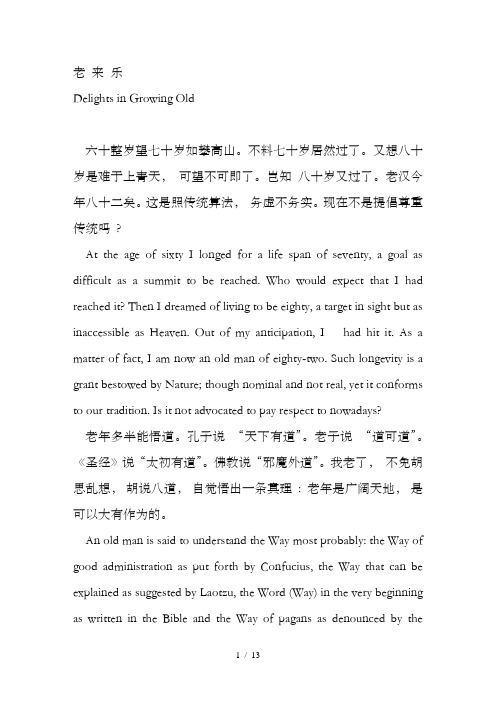
老来乐Delights in Growing Old六十整岁望七十岁如攀高山。
不料七十岁居然过了。
又想八十岁是难于上青天,可望不可即了。
岂知八十岁又过了。
老汉今年八十二矣。
这是照传统算法,务虚不务实。
现在不是提倡尊重传统吗?At the age of sixty I longed for a life span of seventy, a goal as difficult as a summit to be reached. Who would expect that I had reached it? Then I dreamed of living to be eighty, a target in sight but as inaccessible as Heaven. Out of my anticipation, I had hit it. As a matter of fact, I am now an old man of eighty-two. Such longevity is a grant bestowed by Nature; though nominal and not real, yet it conforms to our tradition. Is it not advocated to pay respect to nowadays?老年多半能悟道。
孔子说“天下有道”。
老子说“道可道”。
《圣经》说“太初有道”。
佛教说“邪魔外道”。
我老了,不免胡思乱想,胡说八道,自觉悟出一条真理: 老年是广阔天地,是可以大有作为的。
An old man is said to understand the Way most probably: the Way of good administration as put forth by Confucius, the Way that can be explained as suggested by Laotzu, the Word (Way) in the very beginning as written in the Bible and the Way of pagans as denounced by theBuddhists. As I am growing old, I can't help being given to flights of fancy and having my own Way of creating stories. However I have come to realize the truth: my old age serves as a vast world in which I can still have my talents employed fully and developed completely.七十岁开始可以诸事不做而拿退休金,不愁没有一碗饭吃,自由自在,自得其乐。
第4届韩素音青年翻译比赛英译汉原文及参考译文
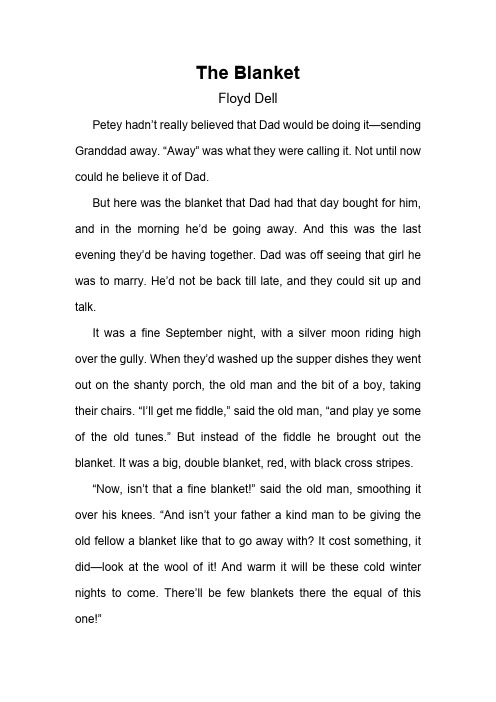
The BlanketFloyd DellPetey hadn’t really believed that Dad would be doing it—sending Granddad away. “Away” was what they were calling it. Not until now could he believe it of Dad.But here was the blanket that Dad had that day bought for him, and in the morning he’d be going away. And this was the last evening they’d be having together. Dad was off seeing that girl he was to marry. He’d not be back till late, and they could sit up and talk.It was a fine September night, with a silver moon riding high over the gully. When they’d washed up the supper dishes they went out on the shanty porch, the old man and the bit of a boy, taking their chairs. “I’ll get me fiddle,” said the old man, “and play ye some of the old tunes.” But instead of the fiddle he brought out the blanket. It was a big, double blanket, red, with black cross stripes.“Now, isn’t that a fine blanket!” said the old man, smoothing it over his knees. “And isn’t your father a kind man to be giving the old fellow a blanket like that to go away with? It cost something, it did—look at the wool of it! And warm it will be these cold winter nights to come. There’ll be few blankets there the equal of this one!”It was like Granddad to be saying that. He was trying to make it easier. He’d pretended all along it was he that wanting to go away to the great brick building—the government place, where he’d be with so many other old fellows having the best of everything.... But Petey hadn’t believed Dad would really do it, until this night when he brought home the blanket.“Oh, yes, it’s a fine blanket,” said Petey, and got up and went into the shanty. He wasn’t the kind to cry, and, besides, he was too old for that, being eleven. He’d just come in to fetch Granddad’s fiddle.The blanket slid to the floor as the old man took the fiddle and stood up. It was the last night they’d be having together. There wasn’t any need to say, “Play all the old tunes.” Granddad tuned up for a minute, and then said, “This is one you’ll like to remember.”The silver moon was high overhead, and there was a gentle breeze playing down the gully. He’d never be hearing Granddad play like this again. It was as well Dad was moving into that new house, away from here. He’d not want, Petey wouldn’t, to sit here on the old porch of fine evenings, with Granddad gone.The tune changed. “Here’s something gayer.” Petey sat and stared out over the gully. Dad would marry that girl. Yes, that girl who’d kissed him and slobbered over him, saying she’d try to be agood mother to him, and all.... His chair creaked as he involuntarily gave his body a painful twist.The tune stopped suddenly, and Granddad said: “It’s a poor tune, except to be dancing to.” And then: “It’s a fine girl your father’s going to marry. He’ll be feeling young again, with a pretty wife like that. And what would an old fellow like me be doing around their house, getting in the way, an old nuisance, what with my talk of aches and pains! And then there’ll be babies coming, and I’d not want to be there to hear them crying at all hours. It’s best that I take myself off, like I’m doing. One more tune or two, and then we’ll be going to bed to get some sleep against the morning, when I’ll pack up my fine blanket and take my leave. Listen to this, will you? It’s a bit sad, but a fine tune for a night like this.”They didn’t hear the two people coming down the gully path, Dad and the pretty girl with the hard, bright face like a china doll’s. but they heard her laugh, right by the porch, and the tune stopped on a wrong, high, startled note. Dad didn’t say anything, but the girl came forward and spoke to Granddad prettily: “I’ll not be seeing you leave in the morning, so I came over to say good-by.”“It’s kind of you,” said Granddad, with his eyes cast down; and then, seeing the blanket at his feet, he stopped to pick it up. “Andwill you look at this,” he said in embarrassment, “the fine blanket my son has given me to go away with!”“Yes,” she said, “it’s a fine blanket.” She felt of the wool, and repeated in surprise, “A fine blanket—I’ll say it is!” She turned to Dad, and said to him coldly, “it cost something, that.”He cleared his throat, and said defensively, “I wanted him to have the best...”The girl stood there, still intent on the blanket. “It’s double, too,” she said reproachfully to Dad.“Yes,” said Granddad, “it’s double—a fine blanket for an old fellow to be going away with.”The boy went abruptly into the shanty. He was looking for something. He could hear that girl reproaching Dad, and Dad becoming angry in his slow way. And now she was suddenly going away in a huff.... As Petey came out, she turned and called back, “All the same, he doesn’t need a double blanket!” And she ran up the gully path.Dad was looking after her uncertainly.“Oh, she’s right,” said the boy coldly. “Here, Dad”—and he held out a pair of scissors. “Cut the blanket in two.”Both of them stared at the boy, startled. “Cut it in two, I tell you, Dad!” he cried out. “And keep the other half!”“That’s not a bad idea,” said Granddad gently. “I don’t need so much of a blanket.”“Yes,” said the boy harshly, “a single blanket is enough for an old man when he’s sent away. We’ll save the other half, Dad; it will come in handy later.”“Now, what do you mean by that?” asked Dad.“I mean,” said the boy slowly,” that I’ll give it to you, Dad—when you’re old and I’m sending you—away.”There was a silence, and then Dad went over to Granddad and stood before him, not speaking. But Granddad understood, for he put out a hand and laid it on Dad’s shoulder. Petey was watching them. And he heard Granddad whisper, “It’s all right, son—I knew you didn’t mean it....” And then Petey cried.But it didn’t matter—because they were all three crying together.译文:一床双人毛毯(美)弗罗伊德•戴尔晴朗的九月的夜晚,银色的月光洒落在溪谷上。
历届韩素音翻译大奖赛竞赛原文及译文
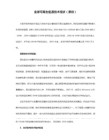
历届韩素音翻译大奖赛竞赛原文及译文英译汉部分 (3)Beauty (excerpt) (3)美(节选) (3)The Literature of Knowledge and the Literature of Power byThomas De Quincey (8)知识文学与力量文学托马斯.昆西 (8)An Experience of Aesthetics by Robert Ginsberg (11)审美的体验罗伯特.金斯伯格 (11)A Person Who Apologizes Has the Moral Ball in His Court by Paul Johnson (14)谁给别人道歉,谁就在道义上掌握了主动保罗.约翰逊 (14)On Going Home by Joan Didion (18)回家琼.狄迪恩 (18)The Making of Ashenden (Excerpt) by Stanley Elkin (22)艾兴登其人(节选)斯坦利.埃尔金 (22)Beyond Life (28)超越生命[美] 卡贝尔著 (28)Envy by Samuel Johnson (33)论嫉妒[英]塞缪尔.约翰逊著 (33)中译英部分 (37)在义与利之外 (37)Beyond Righteousness and Interests (37)读书苦乐杨绛 (40)The Bitter-Sweetness of Reading Yang Jiang (40)想起清华种种王佐良 (43)Reminiscences of Tsinghua Wang Zuoliang (43)歌德之人生启示宗白华 (45)What Goethe's Life Reveals by Zong Baihua (45)怀想那片青草地赵红波 (48)Yearning for That Piece of Green Meadow by Zhao Hongbo (48)可爱的南京 (51)Nanjing the Beloved City (51)霞冰心 (53)The Rosy Cloud byBingxin (53)黎明前的北平 (54)Predawn Peiping (54)老来乐金克木 (55)Delights in Growing Old by Jin Kemu (55)可贵的“他人意识” (58)Calling for an Awareness of Others (58)教孩子相信 (61)To Implant In Our Children’s Young Hearts An Undying Faith In Humanity (61)英译汉部分Beauty (excerpt)美(节选)Judging from the scientists I know, including Eva and Ruth, and those whom I've read about, you can't pursue the laws of nature very long without bumping撞倒; 冲撞into beauty. “I don't know if it's the same beauty you see in the sunset,”a friend tells me, “but it feels the same.”This friend is a physicist, who has spent a long career deciphering破译(密码), 辨认(潦草字迹) what must be happening in the interior of stars. He recalls for me this thrill on grasping for the first time Dirac's⑴equations describing quantum mechanics, or those of Einstein describing relativity. “They're so beautiful,” he says, “you can see immediately they have to be true. Or at least on the way toward truth.” I ask him what makes a theory beautiful, and he replies, “Si mplicity, symmetry .对称(性); 匀称, 整齐, elegance, and power.”我结识一些科学家(包括伊娃和露丝),也拜读过不少科学家的著作,从中我作出推断:人们在探求自然规律的旅途中,须臾便会与美不期而遇。
韩素英翻译大赛原文
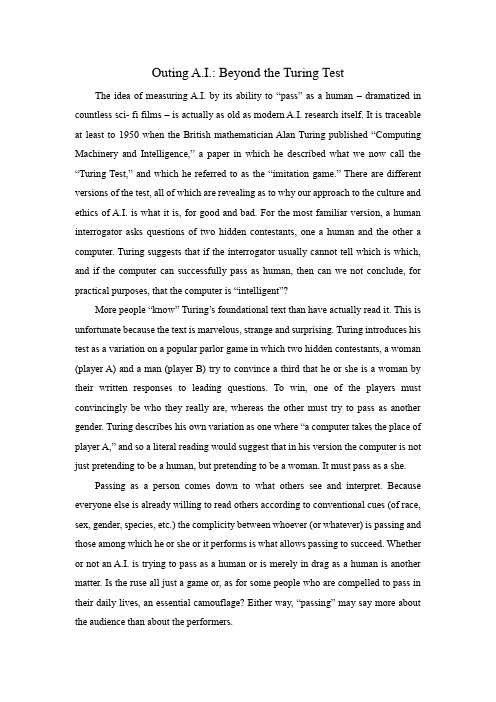
Outing A.I.: Beyond the Turing TestThe idea of measuring A.I. by its ability to “pass” as a human – dramatized in countless sci- fi films – is actually as old as modern A.I. research itself. It is traceable at least to 1950 when the British mathematician Alan Turing published “Computing Machinery and Intelligence,” a paper in which he described what we now call the “Turing Test,” and which he referred to as the “imitation game.” There are different versions of the test, all of which are revealing as to why our approach to the culture and ethics of A.I. is what it is, for good and bad. For the most familiar version, a human interrogator asks questions of two hidden contestants, one a human and the other a computer. Turing suggests that if the interrogator usually cannot tell which is which, and if the computer can successfully pass as human, then can we not conclude, for practical purposes, that the computer is “intelligent”?More people “know” Turing’s foundational text than have actually read it. This is unfortunate because the text is marvelous, strange and surprising. Turing introduces his test as a variation on a popular parlor game in which two hidden contestants, a woman (player A) and a man (player B) try to convince a third that he or she is a woman by their written responses to leading questions. To win, one of the players must convincingly be who they really are, whereas the other must try to pass as another gender. Turing describes his own variation as one where “a computer takes the place of player A,” and so a literal reading would suggest that in his version the computer is not just pretending to be a human, but pretending to be a woman. It must pass as a she.Passing as a person comes down to what others see and interpret. Because everyone else is already willing to read others according to conventional cues (of race, sex, gender, species, etc.) the complicity between whoever (or whatever) is passing and those among which he or she or it performs is what allows passing to succeed. Whether or not an A.I. is trying to pass as a human or is merely in drag as a human is another matter. Is the ruse all just a game or, as for some people who are compelled to pass in their daily lives, an essential camouflage? Either way, “passing” may say more about the audience than about the performers.That we would wish to define the very existence of A.I. in relation to its ability to mimic how humans think that humans think will be looked back upon as a weird sort of speciesism. The legacy of that conceit helped to steer some older A.I. research down disappointingly fruitless paths, hoping to recreate human minds from available parts. It just doesn’t work that way. Contemporary A.I. research suggests instead that the threshold by which any particular arrangement of matter can be said to be “intelligent” doesn’t have much to do with how it reflects humanness back at us. As Stuart Russell and Peter Norvig (now director of research at Google) suggest in their essential A.I. textbook, biomorphic imitation is not how we design complex technology. Airplanes don’t fly like birds fly, and we certainly don’t try to trick birds into thinking that airplanes are birds in order to test whether those planes “really” are flying machines. Why do it for A.I. then? Today’s serious A.I. research does not focus on the Turing Test as an objective criterion of success, and yet in our popular culture of A.I., the test’s anthropocentrism holds such durable conceptual importance. Like the animals who talk like teenagers in a Disney movie, other minds are conceivable mostly by way of puerile ventriloquism.Where is the real injury in this? If we want everyday A.I. to be congenial in a humane sort of way, so what? The answer is that we have much to gain from a more sincere and disenchanted relationship to synthetic intelligences, and much to lose by keeping illusions on life support. Some philosophers write about the possible ethical “rights” of A.I. as sentient entities, but that’s not my point here. Rather, the truer perspective is also the better one for us as thinking technical creatures.Musk, Gates and Hawking made headlines by speaking to the dangers that A.I. may pose. Their points are important, but I fear were largely misunderstood by many readers. Relying on efforts to program A.I. not to “harm humans” (inspired by Isaac Asimov’s “three laws” of robotics from 1942) makes sense only when an A.I. knows what humans are and what harming them might mean. There are many ways that an A.I. might harm us that have nothing to do with its malevolence toward us, and chief among these is exactly following our well-meaning instructions to an idiotic and catastrophic extreme. Instead of mechanical failure or a transgression of moral code, the A.I. maypose an existential risk because it is both powerfully intelligent and disinterested in humans. To the extent that we recognize A.I. by its anthropomorphic qualities, or presume its preoccupation with us, we are vulnerable to those eventualities.Whether or not “hard A.I.” ever appears, the harm is also in the loss of all that we prevent ourselves from discovering and understanding when we insist on protecting beliefs we know to be false. In the 1950 essay, Turing offers several rebuttals to his speculative A.I., including a striking comparison with earlier objections to Copernican astronomy. Copernican traumas that abolish the false centrality and absolute specialness of human thought and species-being are priceless accomplishments. They allow for human culture based on how the world actually is more than on how it appears to us from our limited vantage point. Turing referred to these as “theological objections,” but one could argue that the anthropomorphic precondition for A.I. is a “pre-Copernican” attitude as well, however secular it may appear. The advent of robust inhuman A.I. may let us achieve another disenchantment, one that should enable a more reality-based understanding of ourselves, our situation, and a fuller and more complex understanding of what “intelligence” is and is not. From there we can hopefully make our world with a greater confidence that our models are good approximations of what’s out there.人工智能:超越图灵实验以人工智能“冒充”人的能力的来衡量人工智能的这个概念---已经被数不清的科幻电影搬上了荧幕---实际上已经和现代人工智能研究一样久远了。
第23届韩素音青年翻译奖竞赛汉译英原文
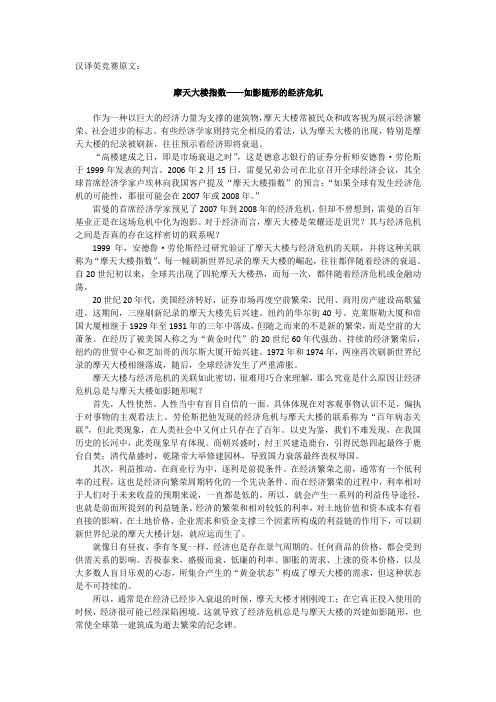
汉译英竞赛原文:摩天大楼指数——如影随形的经济危机作为一种以巨大的经济力量为支撑的建筑物,摩天大楼常被民众和政客视为展示经济繁荣、社会进步的标志。
有些经济学家则持完全相反的看法,认为摩天大楼的出现,特别是摩天大楼的纪录被刷新,往往预示着经济即将衰退。
“高楼建成之日,即是市场衰退之时”,这是德意志银行的证券分析师安德鲁·劳伦斯于1999年发表的判言。
2006年2月15日,雷曼兄弟公司在北京召开全球经济会议,其全球首席经济学家卢埃林向我国客户提及“摩天大楼指数”的预言:“如果全球有发生经济危机的可能性,那很可能会在2007年或2008年。
”雷曼的首席经济学家预见了2007年到2008年的经济危机,但却不曾想到,雷曼的百年基业正是在这场危机中化为泡影。
对于经济而言,摩天大楼是荣耀还是诅咒?其与经济危机之间是否真的存在这样密切的联系呢?1999年,安德鲁·劳伦斯经过研究验证了摩天大楼与经济危机的关联,并将这种关联称为“摩天大楼指数”。
每一幢刷新世界纪录的摩天大楼的崛起,往往都伴随着经济的衰退。
自20世纪初以来,全球共出现了四轮摩天大楼热,而每一次,都伴随着经济危机或金融动荡。
20世纪20年代,美国经济转好,证券市场再度空前繁荣,民用、商用房产建设高歌猛进。
这期间,三座刷新纪录的摩天大楼先后兴建。
纽约的华尔街40号、克莱斯勒大厦和帝国大厦相继于1929年至1931年的三年中落成,但随之而来的不是新的繁荣,而是空前的大萧条。
在经历了被美国人称之为“黄金时代”的20世纪60年代强劲、持续的经济繁荣后,纽约的世贸中心和芝加哥的西尔斯大厦开始兴建。
1972年和1974年,两座再次刷新世界纪录的摩天大楼相继落成,随后,全球经济发生了严重滞胀。
摩天大楼与经济危机的关联如此密切,很难用巧合来理解,那么究竟是什么原因让经济危机总是与摩天大楼如影随形呢?首先,人性使然。
人性当中有盲目自信的一面。
具体体现在对客观事物认识不足,偏执于对事物的主观看法上。
历届韩素音翻译大奖赛竞赛原文及译文
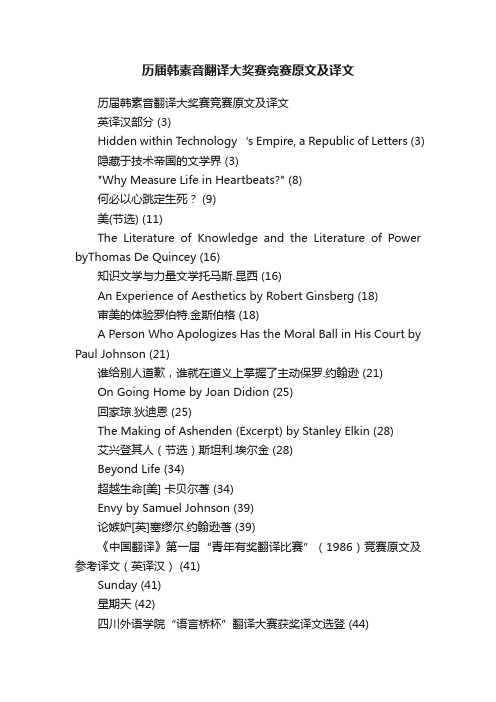
历届韩素音翻译大奖赛竞赛原文及译文历届韩素音翻译大奖赛竞赛原文及译文英译汉部分 (3)Hidden within Technology‘s Empire, a Republic of Letters (3)隐藏于技术帝国的文学界 (3)"Why Measure Life in Heartbeats?" (8)何必以心跳定生死? (9)美(节选) (11)The Literature of Knowledge and the Literature of Power byThomas De Quincey (16)知识文学与力量文学托马斯.昆西 (16)An Experience of Aesthetics by Robert Ginsberg (18)审美的体验罗伯特.金斯伯格 (18)A Person Who Apologizes Has the Moral Ball in His Court by Paul Johnson (21)谁给别人道歉,谁就在道义上掌握了主动保罗.约翰逊 (21)On Going Home by Joan Didion (25)回家琼.狄迪恩 (25)The Making of Ashenden (Excerpt) by Stanley Elkin (28)艾兴登其人(节选)斯坦利.埃尔金 (28)Beyond Life (34)超越生命[美] 卡贝尔著 (34)Envy by Samuel Johnson (39)论嫉妒[英]塞缪尔.约翰逊著 (39)《中国翻译》第一届“青年有奖翻译比赛”(1986)竞赛原文及参考译文(英译汉) (41)Sunday (41)星期天 (42)四川外语学院“语言桥杯”翻译大赛获奖译文选登 (44)第七届“语言桥杯”翻译大赛获奖译文选登 (44)The Woods: A Meditation (Excerpt) (46)林间心语(节选) (47)第六届“语言桥杯”翻译大赛获奖译文选登 (50)第五届“语言桥杯”翻译大赛原文及获奖译文选登 (52)第四届“语言桥杯”翻译大赛原文、参考译文及获奖译文选登 (54) When the Sun Stood Still (54)永恒夏日 (55)CASIO杯翻译竞赛原文及参考译文 (56)第三届竞赛原文及参考译文 (56)Here Is New York (excerpt) (56)这儿是纽约 (58)第四届翻译竞赛原文及参考译文 (61)Reservoir Frogs (Or Places Called Mama's) (61)水库青蛙(又题:妈妈餐馆) (62)中译英部分 (66)蜗居在巷陌的寻常幸福 (66)Simple Happiness of Dwelling in the Back Streets (66)在义与利之外 (69)Beyond Righteousness and Interests (69)读书苦乐杨绛 (72)The Bitter-Sweetness of Reading Yang Jiang (72)想起清华种种王佐良 (74)Reminiscences of Tsinghua Wang Zuoliang (74)歌德之人生启示宗白华 (76)What Goethe's Life Reveals by Zong Baihua (76)怀想那片青草地赵红波 (79)Yearning for That Piece of Green Meadow by Zhao Hongbo (79)可爱的南京 (82)Nanjing the Beloved City (82)霞冰心 (84)The Rosy Cloud byBingxin (84)黎明前的北平 (85)Predawn Peiping (85)老来乐金克木 (86)Delights in Growing Old by Jin Kemu (86)可贵的“他人意识” (89)Calling for an Awareness of Others (89)教孩子相信 (92)To Implant In Our Children‘s Young Hearts An Undying Faith In Humanity (92)心中有爱 (94)Love in Heart (94)英译汉部分Hidden within Technology’s Empire, a Republic of Le tters 隐藏于技术帝国的文学界索尔·贝娄(1)When I was a boy ―discovering literature‖, I used to think how wonderful it would be if every other person on the street were familiar with Proust and Joyce or T. E. Lawrence or Pasternak and Kafka. Later I learned how refractory to high culture the democratic masses were. Lincoln as a young frontiersman read Plutarch, Shakespeare and the Bible. But then he was Lincoln.我还是个“探索文学”的少年时,就经常在想:要是大街上人人都熟悉普鲁斯特和乔伊斯,熟悉T.E.劳伦斯,熟悉帕斯捷尔纳克和卡夫卡,该有多好啊!后来才知道,平民百姓对高雅文化有多排斥。
韩素音青年翻译奖竞赛CATTI杯
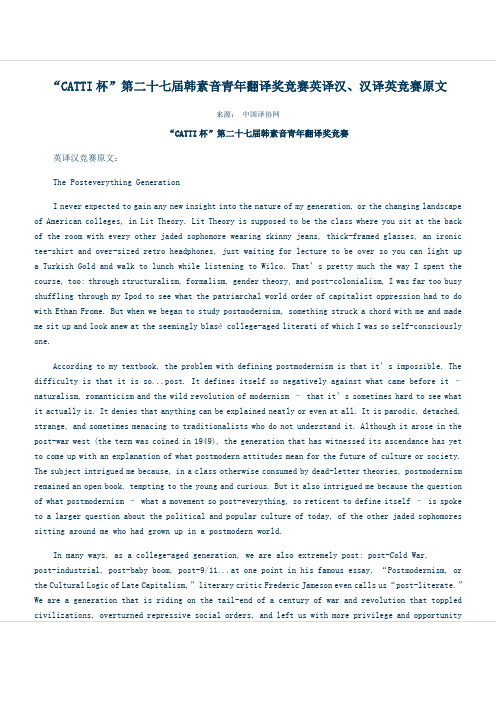
“CATTI杯”第二十七届韩素音青年翻译奖竞赛英译汉、汉译英竞赛原文来源:中国译协网“CATTI杯”第二十七届韩素音青年翻译奖竞赛英译汉竞赛原文:The Posteverything GenerationI never expected to gain any new insight into the nature of my generation, or the changing landscape of American colleges, in Lit Theory. Lit Theory is supposed to be the class where you sit at the back of the room with every other jaded sophomore wearing skinny jeans, thick-framed glasses, an ironic tee-shirt and over-sized retro headphones, just waiting for lecture to be over so you can light up a Turkish Gold and walk to lunch while listening to Wilco. That’s pretty much the way I spent the course, too: through structuralism, formalism, gender theory, and post-colonialism, I was far too busy shuffling through my Ipod to see what the patriarchal world order of capitalist oppression had to do with Ethan Frome. But when we began to study postmodernism, something struck a chord with me and made me sit up and look anew at the seemingly blasé college-aged literati of which I was so self-consciously one.According to my textbook, the problem with defining postmodernism is that it’s impossible. The difficulty is that it is so...post. It defines itself so negatively against what came before it –naturalism, romanticism and the wild revolution of modernism – that it’s sometimes hard to see what it actually is. It denies that anything can be explained neatly or even at all. It is parodic, detached, strange, and sometimes menacing to traditionalists who do not understand it. Although it arose in the post-war west (the term was coined in 1949), the generation that has witnessed its ascendance has yet to come up with an explanation of what postmodern attitudes mean for the future of culture or society. The subject intrigued me because, in a class otherwise consumed by dead-letter theories, postmodernism remained an open book, tempting to the young and curious. But it also intrigued me because the question of what postmodernism – what a movement so post-everything, so reticent to define itself – is spoke to a larger question about the political and popular culture of today, of the other jaded sophomores sitting around me who had grown up in a postmodern world.In many ways, as a college-aged generation, we are also extremely post: post-Cold War,post-industrial, post-baby boom, post-9/11...at one point in his famous essay, “Postmodernism, or the Cultural Logic of Late Capitalism,” literary critic Frederic Jameson even calls us “post-literate.”We are a generation that is riding on the tail-end of a century of war and revolution that toppled civilizations, overturned repressive social orders, and left us with more privilege and opportunitythan any other society in history. Ours could be an era to accomplish anything.And yet do we take to the streets and the airwaves and say “here we are, and this is what we demand”? Do we plant our flag of youthful rebellion on the mall in Washington and say “we are not leaving until we see change! Our eyes have been opened by our education and our conception of what is possible has been expanded by our privilege and we demand a better world because it is our right”? It would seem we do the opposite. We go to war without so much as questioning the rationale, we sign away our civil liberties, we say nothing when the Supreme Court uses Brown v. Board of Education to outlaw desegregation, and we sit back to watch the carnage on the evening news.On campus, we sign petitions, join organizations, put our names on mailing lists, make small-money contributions, volunteer a spare hour to tutor, and sport an entire wardrobe’s worth of Live Strong bracelets advertising our moderately priced opposition to everything from breast cancer to global warming. But what do we really stand for? Like a true postmodern generation we refuse to weave together an overarching narrative to our own political consciousness, to present a cast of inspirational or revolutionary characters on our public stage, or to define a specific philosophy. We are a story seemingly without direction or theme, structure or meaning – a generation defined negatively against what came before us. When Al Gore once said “It’s the combination of narcissism and nihilism that really defines postmodernism,” he might as well have been echoing his entire generation’s critique of our own. We are a generation for whom even revolution seems trite, and therefore as fair a target for bland imitation as anything else. We are the generation of the Che Geuvera tee-shirt.Jameson calls it “Pastiche”–“the wearing of a linguistic mask, speech in a dead language.”In literature, this means an author speaking in a style that is not his own – borrowing a voice and continuing to use it until the words lose all meaning and the chaos that is real life sets in. It is an imitation of an imitation, something that has been re-envisioned so many times the original model is no longer relevant or recognizable. It is mass-produced individualism, anticipated revolution. It is why postmodernism lacks cohesion, why it seems to lack purpose or direction. For us, thepost-everything generation, pastiche is the use and reuse of the old clichés of social change and moral outrage – a perfunctory rebelliousness that has culminated in the age of rapidly multiplyingnon-profits and relief funds. We live our lives in masks and speak our minds in a dead language –the language of a society that expects us to agitate because that’s what young people do. But how do we rebel against a generation that is expecting, anticipating, nostalgic for revolution?How do we rebel against parents that sometimes seem to want revolution more than we do? We don’t. We rebel by not rebelling. We wear the defunct masks of protest and moral outrage, but the real energy in campus activism is on the internet, with websites like . It is in the rapidly developing ability to communicate ideas and frustration in chatrooms instead of on the streets, and channel them into nationwide projects striving earnestly for moderate and peaceful change: we are thegeneration of Students Taking Action Now Darfur; we are the Rock the Vote generation; the generation of letter-writing campaigns and public interest lobbies; the alternative energy generation.College as America once knew it – as an incubator of radical social change – is coming to an end. To our generation the word “radicalism” evokes images of al Qaeda, not the Weathermen. “Campus takeover” sounds more like Virginia Tech in 2007 than Columbia University in 1968. Such phrases are a dead language to us. They are vocabulary from another era that does not reflect the realities of today. However, the technological revolution, the revolution, the revolution of the organization kid, is just as real and just as profound as the revolution of the 1960’s – it is just not as visible. It is a work in progress, but it is there. Perhaps when our parents finally stop pointing out the things that we are not, the stories that we do not write, they will see the threads of our narrative begin to come together; they will see that behind our pastiche, the post generation speaks in a language that does make sense. We are writing a revolution. We are just putting it in our own words.汉译英竞赛原文:保护古村落就是保护“根性文化”传统村落是指拥有物质形态和非物质形态文化遗产,具有较高的历史、文化、科学、艺术、社会、经济价值的村落。
韩素音青年翻译奖竞赛原文

韩素音青年翻译奖竞赛原文第二十六届“韩素音青年翻译奖”竞赛原文英译汉竞赛原文:How the News Got Less MeanThe most read article of all time on BuzzFeed contains no photographs of celebrity nip slips and no inflammatory ranting. It’s a series of photos called “21 pictures that will restore your faith in humanity,”which has pulled in nearly 14 million visits so far. At Upworthy too, hope is the major draw. “This kid just died. What he left behind is wondtacular,”an Upworthy post about a terminally ill teen singer, earned 15 million views this summer and has raised more than $300,000 for cancer research.The recipe for attracting visitors to stories online is changing. Bloggers have traditionally turned to sarcasm and snark to draw attention. But the success of sites like BuzzFeed and Upworthy, whose philosophies embrace the viral nature of upbeat stories, hints that the Web craves positivity.The reason: social media. Researchers are discovering that people want to create positive images of themselves online by sharing upbeat stories. And with more people turning to Facebook and Twitter to find out what’s happening in the world, news stories may need to cheer up inorder to court an audience. If social is the future of media, then optimistic stories might be media’s future.“When we started, the prevailing wisdom was that snark ruled the Internet,”says Eli Pariser, a co-founder of Upworthy. “And we just had a really different sense of what works.”“You don’t want to be that guy at the party who’s crazy and angry and ranting in the corner —it’s the same for Twitteror Facebook,”he says. “Part of what we’re trying to d o with Upworthy is give people the tools to express a conscientious, thoughtful and positive identity in social media.”And the science appears to support Pariser’s philosophy. In a recent study from the Massachusetts Institute of Technology, researchers f ound that “up votes,”showing that a visitor liked a comment or story, begat more up votes on comments on the site, but “down votes”did not do the same. In fact, a single up vote increased the likelihood that someone else would like a comment by 32%, wherea s a down vote had no effect. People don’t want to support the cranky commenter, the critic or the troll. Nor do they want to be that negative personality online.In another study published in 2012, Jonah Berger, author of Contagious: Why Things Catch On and professor of marketing at the Wharton School of the University of Pennsylvania, monitored the most e-mailed stories produced by the New York Times for six months andfound that positive stories were more likely to make the list than negative ones.“What we share [or like] is almost like the car we drive or the clothes we wear,”he says. “It says something about us to other people. So people would much rather be seen as a Positive Polly than a Debbie Downer.”It’s not always that simple: Berger says that th ough positive pieces drew more traffic than negative ones, within the categories of positive and negative stories, those articles that elicited more emotion always led to more shares.“Take two negative emotions, for example: anger and sadness,”Berger says. “Both of those emotions would make the reader feel bad. But anger, a high arousal emotion, leads to moresharing, whereas sadness, a low arousal emotion, doesn’t. The same is true of the positive side: excitement and humor increase sharing, whereas conte ntment decreases sharing.”And while some popular BuzzFeed posts —like the recent “Is this the most embarrassing interview Fox News has ever done?”—might do their best to elicit shares through anger, both BuzzFeed and Upworthy recognize that their main success lies in creating positive viral material.“It’s not that people don’t share negative stories,”says Jack Shepherd, editorial director at BuzzFeed. “It just means that there’s ahigher potential for positive stories to do well.”Upworthy’s mission is to highlight serious issues but in a hopeful way, encouraging readers to donate money, join organizations and take action. The strategy seems to be working: barely two years after its launch date (in March 2012), the site now boasts 30 million unique visitors per month, according to Upworthy. The site’s average monthly unique visitors grew to 14 million people over its first six quarters —to put that in perspective, the Huffington Post had only about 2 million visitors in its first six quarters online.But Upworthy measures the success of a story not just by hits. The creators of the site only consider a post a success if it’s also shared frequently on social media. “We are interested in content that people want to share partly for pragmatic reasons,”Pariser s ays. “If you don’t have a good theory about how to appear in Facebook and Twitter, then you may disappear.”Nobody has mastered the ability to make a story go viral like BuzzFeed. The site, which began in 2006 as a lab to figure out what people share onlin e, has used what it’s learned to draw 60million monthly unique visitors, according to BuzzFeed. (Most of that traffic comes from social-networking sites, driving readers toward BuzzFeed’s mix of cute animal photos and hard news.) By comparison the New York Times website, one of the most popular newspaper sites on the Web,courts only 29 million unique visitors each month, according to the Times.BuzzFeed editors have found that people do still read negative or critical stories, they just aren’t the posts t hey share with their friends. And those shareable posts are the ones that newsrooms increasingly prize.“Anecdotally, I can tell you people are just as likely to click on negative stories as they are to click on positive ones,”says Shepherd. “But they’re m ore likely to share positive stories. What you’re interested in is different from what you want your friends to see what you’re interested in.”So as newsrooms re-evaluate how they can draw readers and elicit more shares on Twitter and Facebook, they may look to BuzzFeed’s and Upworthy’s happiness model for direction.“I think that the Web is only becoming more social,”Shepherd says. “We’re at a point where readers are your publishers. If news sites aren’t thinking about what it would mean for someone to share a story on social media, that could be detrimental.”汉译英竞赛原文:城市的迷失沿着瑗珲—腾冲线,这条1935年由胡焕庸先生发现并命名的中国人口、自然和历史地理的分界线,我们看到,从远距离贸易发展开始的那天起,利益和权力的渗透与分散,已经从根本结构上改变了城市的状态:城市在膨胀,人在疏离。
- 1、下载文档前请自行甄别文档内容的完整性,平台不提供额外的编辑、内容补充、找答案等附加服务。
- 2、"仅部分预览"的文档,不可在线预览部分如存在完整性等问题,可反馈申请退款(可完整预览的文档不适用该条件!)。
- 3、如文档侵犯您的权益,请联系客服反馈,我们会尽快为您处理(人工客服工作时间:9:00-18:30)。
参赛原文:英译汉原文Hidden Within Technology’s Empire, a Republic of LettersWhen I was a boy “discovering literature”, I used to think how wonderful it would be if every other person on the street were familiar with Proust and Joyce or T.E. Lawrence or Pasternak and Kafka. Later I learned how refractory to high culture the democratic masses were. Lincoln as a young frontiersman read Plutarch, Shakespeare and the Bible. But then he was Lincoln.Later when I was traveling in the Midwest by car, bus and train, I regularly visited small-town libraries and found that readers in Keokuk, Iowa, or Benton Harbor, Mich., were checking out Proust and Joyce and even Svevo and Andrei Biely. D. H. Lawrence was also a favorite. And sometimes I remembered that God was willing to spare Sodom for the sake of 10 of the righteous. Not that Keokuk was anything like wicked Sodom, or that Proust‟s Charlus would have been tempted to settle in Benton Harbor, Mich. I seem to have had a persistent democratic desire to find evidences of high culture in the most unlikely places.For many decades now I have been a fiction writer, and from the first I was aware that mine was a questionable occupation. In the 1930‟s an elderly neighbor in Chicago told me that he wrote fiction for the pulps. “The people on the block wonder why I don‟t go to a job, and I‟m seen puttering around, trimming the bushes or painting a fence instead of working in a factory. But I‟m a writer. I sell to Argosy and Doc Savage,” he said with a certain gloom. “They wouldn‟t call that a trade.” Probably he noticed that I was a bookish boy, likely to sympathize with him, and perhaps he was trying to warn me to avoid being unlike others. But it was too late for that.From the first, too, I had been warned that the novel was at the point of death, that like the walled city or the crossbow, it was a thing of the past. And no one likes to be at odds with history. Oswald Spengler, one of the most widely read authors of the early 30‟s, taught that our tired old civilization was ve ry nearly finished. His advice to the young was to avoid literature and the arts and to embrace mechanization and become engineers.In refusing to be obsolete, you challenged and defied the evolutionist historians. I had great respect for Spengler in my youth, but even then I couldn‟t accept his conclusions, and (with respect and admiration) I mentally told him to get lost.Sixty years later, in a recent issue of The Wall Street Journal, I come upon the old Spenglerian argument in a contemporary form. Terry Teachout, unlike Spengler, does not dump paralyzing mountains of historical theory upon us, but there are signs that he has weighed, sifted and pondered the evidence.He speaks of our “atomized culture,” and his is a responsible, up-to-date and care fully considered opinion. He speaks of “art forms as technologies.” He tells us that movies will soon be “downloadable”—that is, transferable from one computer to the memory of another device—and predicts that films will soon be marketed like books. He predicts that the near-magical powers of technology are bringing us to the threshold of a new age and concludes, “Once this happens, my guess is that the independent movie will replace the novel as the principal vehicle for serious storytelling in the 21st ce ntury.”In support of this argument, Mr. Teachout cites the ominous drop in the volume of book sales and the great increase in movie attendance: “For Americans under the age of 30, film has replaced the novel as the dominant mode of artistic expression.”To this Mr. Teachout adds that popular novelists like Tom Clancy and Stephen King “top out at around a million copies per book,” and notes, “The final episode of NBC‟s …Cheers,‟ by contrast, was seen by 42 million people.”On majoritarian grounds, the m ovies win. “The power of novels to shape the national conversation has declined,” says Mr. Teachout. But I am not at all certain that in their day “Moby-Dick” or “The Scarlet Letter” had any considerable influence on “the national conversation.” In the mid-19th century it was “Uncle Tom‟s Cabin” that impressed the great public. “Moby-Dick” was a small-public novel.The literary masterpieces of the 20th century were for the most part the work of novelists who had no large public in mind. The novels of Proust and Joyce were written in a cultural twilight and were not intended to be read under the blaze and dazzle of popularity.Mr. Teachout‟s article in The Journal follows the path generally taken by observers whose aim is to discover a trend. “According t o one recent study 55 percentof Americans spend less than 30 minutes reading anything at all…. It may even be that movies have superseded novels not because Americans have grown dumber but because the novel is an obsolete artistic technology.”“We are not accustomed to thinking of art forms as technologies,” he says, “but that is what they are, which means they have been rendered moribund by new technical developments.”Together with this emphasis on technics that attracts the scientific-minded young, there are other preferences discernible: It is better to do as a majority of your contemporaries are doing, better to be one of millions viewing a film than one of mere thousands reading a book. Moreover, the reader reads in solitude, whereas the viewer belongs to a great majority; he has powers of numerosity as well as the powers of mechanization. Add to this the importance of avoiding technological obsolescence and the attraction of feeling that technics will decide questions for us more dependably than the thinking of an individual, no matter how distinctive he may be.John Cheever told me long ago that it was his readers who kept him going, people from every part of the country who had written to him. When he was at work, he was aware of these readers and correspondents in the woods beyond the lawn. “If I couldn‟t picture them, I‟d be sunk,” he said. And the novelist Wright Morris, urging me to get an electric typewriter, said that he seldom turned his machine off. “WhenI‟m not writing, I listen to the electricity,” he said. “It keeps me company. We have conversations.”I wonder how Mr. Teachout might square such idiosyncrasies with his “art forms as technologies.” Perhaps he would argue that these two writers had somehow isolated themselves from “bro ad-based cultural influence.” Mr. Teachout has at least one laudable purpose: He thinks that he sees a way to bring together the Great Public of the movies with the Small Public of the highbrows. He is, however, interested in millions: millions of dollars, millions of readers, millions of viewers.The one thing “everybody” does is go to the movies, Mr. Teachout says. How right he is.Back in the 20‟s children between the ages of 8 and 12 lined up on Saturdays to buy their nickel tickets to see the crisis of last Saturday resolved. The heroine was untied in a matter of seconds just before the locomotive would have crushed her. Thencame a new episode; and after that the newsreel and “Our Gang.” Finally there was a western with Tom Mix, or a Janet Gaynor picture about a young bride and her husband blissful in the attic, or Gloria Swanson and Theda Bara or Wallace Beery or Adolphe Menjou or Marie Dressler. And of course there was Charlie Chaplin in “The Gold Rush,” and from “The Gold Rush” it was only one st ep to the stories of Jack London.There was no rivalry then between the viewer and the reader. Nobody supervised our reading. We were on our own. We civilized ourselves. We found or made a mental and imaginative life. Because we could read, we learned also to write. It did not confuse me to see “Treasure Island” in the movies and then read the book. There was no competition for our attention.One of the more attractive oddities of the United States is that our minorities are so numerous, so huge. A minority of millions is not at all unusual. But there are in fact millions of literate Americans in a state of separation from others of their kind. They are, if you like, the readers of Cheever, a crowd of them too large to be hidden in the woods. Departments of literature across the country have not succeeded in alienating them from books, works old and new. My friend Keith Botsford and I felt strongly that if the woods were filled with readers gone astray, among those readers there were probably writers as well.To learn in detail of their existence you have only to publish a magazine like The Republic of Letters. Given encouragement, unknown writers, formerly without hope, materialize. One early reader wrote that our paper, “with its contents so fresh, person-to-person,” was “real, non-synthetic, undistracting.” Noting that there were no ads, she asked, “Is it possible, can it last?” and called it “an antidote to the shrinking of the human being in every one of us.” And toward the end of her letter ourcorr espondent added, “It behooves the elder generation to come up with reminders of who we used to be and need to be.”This is what Keith Botsford and I had hoped that our “tabloid for literates” would be. And for two years it has been just that. We are a pair of utopian codgers who feel we have a duty to literature. I hope we are not like those humane do-gooders who, when the horse was vanishing, still donated troughs in City Hall Square for thirsty nags.We have no way of guessing how many independent, self-initiated connoisseurs and lovers of literature have survived in remote corners of the country. The little evidence we have suggests that they are glad to find us, they are grateful. They want more than they are getting. Ingenious technology has failed to give them what they so badly need.蜗居在巷陌的寻常幸福隐逸的生活似乎在传统意识中一直被认为是幸福的至高境界。
